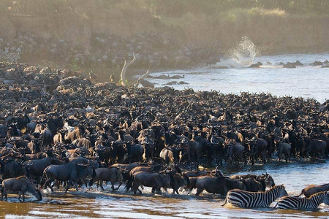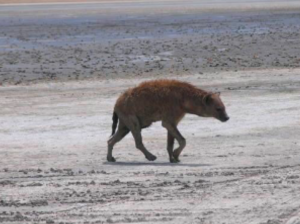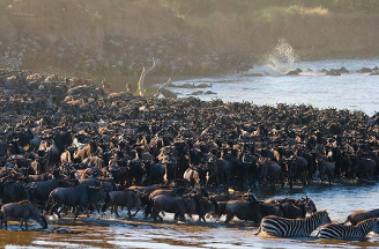Our company is a collective of amazing people striving to build delightful products
Today, the rights of nature are more than ideals confined to speech; they demand action. In response to our current ecological crisis, more and more governments, groups of lawyers, teacher-researchers, members of a community, and NGOs are declaring, in concrete form, the rights of natural entities.
Given the scope of the rights of nature, this new paradigm is unfolding in a growing number of initiatives across several disciplines and regions on the African continent. Countries like Ethiopia, Kenya, Nigeria, South Africa, Uganda, Zimbabwe, and Tanzania have begun developing education systems to educate lawyers, teachers, and students in the rights of nature. These experts will, in turn, be responsible for raising awareness among the general public. Further advances include the introduction of the rights of nature into the National Environment Act in Uganda, the draft of a law on the rights of the River Ethiope in Nigeria, the publication of the reference book Wild Law by the influential South African author Cormac Cullinan, and the environmental education and rights recognition activities in Serengeti National Park in Tanzania, all of which promote life in harmony with nature and defend the rights of nature and of indigenous peoples—and all of which are the result of work and initiatives led by local actors.
In Tanzania, the Serengeti National Park is a vital concern for local advocates of the rights of nature. Designated as a World Heritage Site and a World Wonder, the Serengeti is known for its abundance of wildlife species and its biodiversity, with more than 500 species of birds and 300 species of mammals (including 80 large mammals). [1] [2]
Commonly referred to as “endless plains” by the indigenous Maasai people, the Serengeti welcomes the largest remaining intact animal migration in the world, in which more than a million wildebeest and hundreds of thousands of other ungulates (gazelles, zebras) engage in an annual 1,000 km circular trek, straddling neighbouring countries Kenya and Tanzania. Ibid.

This world-renowned phenomenon is threatened by several interrelated factors, including the proliferation of housing in this magnificent wildlife sanctuary, human population growth, anthropogenic pressure on natural resources, land-use expansion, and climate change. [4]
Since the park has only one continuously flowing water source, the Mara River, the scarcity of surface water also poses a threat to the integrity of the park.

The following is an excerpt from our interview with Kisula Yeyeye, an activist and member of the Tanzanian chapter of the Nature’s Rights organization working to recognize Serengeti National Park as a subject of law.
1. What are your reasons for wanting to recognize the Serengeti National Park as a legal entity?
“The reason for recognizing the Serengeti National Park as a legal entity is because people are destroying nature because they consider it as their property, they are not concerned about the protection and conservation of nature. So, they think that they can do whatever they want with nature. For example, a political party opposed to the current government was planning to build a road in the Serengeti National Park. That way, when the Serengeti National Park is recognized, it will be able to file petitions on behalf of the ecosystem, which will help preserve our nature for future generations. Nature must develop freely, and human influence must disappear. Granting a right to Serengeti National Park would give it the right to exist, persist, maintain, and generate its life cycles, structure, functions, and evolutionary process.
Nature and human beings depend on each other to exist, man depends on nature for everything and anything, if nature is destroyed, then it will destroy the ecosystem, that is why Serengeti National Park is very important for Tanzania and the world in general.”
2. Who are the actors having a positive and negative impact on the Serengeti National Park?
“The actors who are having a positive impact are activists like Kisula Yeyeye and the Tanzanian chapter of Nature’s Rights, as well as some local politicians, students and pupils and teachers who benefit from seminars and workshops of the Tanzanian chapter of Nature’s Rights. We (the stakeholders) are very concerned to ensure that Serengeti National Park is recognized and given a legal entity, which can help the National Park to defend its own interests and have the right to sue for future generations.
Actors who have a negative impact on Serengeti National Park are politicians and some members of parliament who seek to make the park a political object.”
3. Do you know of effective and fruitful ways to recognize a natural entity as a subject of law in Africa?
“They go through consolidation and recognition, after which each African country must put in place a law (constitution). This will be the best way to recognize a natural entity, because it will be considered as a human being because of the rights due to it and will be prosecuted for its own rights. The law must be strong and very strict regarding nature offenders in national parks, and this could make people afraid to break the laws concerning nature.”
4. Do you have any other ongoing projects to recognize natural entities as subjects of law in Tanzania?
“There are only two projects in progress. One is tree planting and the other is training in conservation and nature protection in four districts. After these projects, I intend to move on to five more districts, but that will depend on the funds available.”
5. What would you like OIDN to support you on?
“I don’t have a car or a motorcycle to get from one point to another, because since graduating from law school in 2008, I have been committed to conservation and protection of nature. I don’t have sources of funding, but I work with my energy, no matter what challenges I face. Also, I don’t have the tools to collect data when I’m in the field. These are my challenges… If they are met, we will succeed in our plan to serve nature in Africa and in the world at large.” In this month of generosity marked by World Humanitarian Day on 19 August, OIDN is asking you to support our Tanzanian partner in their work to have the Serengeti National Park, including the Mara River, declared a subject of law.
Click here to support our work.
Together, we will preserve and defend Mother Nature.
[1] UNESCO World Heritage Centre. (Unknown). “Serengeti National Park”. Accessed 31 July 2020. https://whc.unesco.org/fr/list/156/. [2] “Travel information on Serengeti National Park – Tanzania”. Accessed 31 July 2020. https://www.serengeti.com/information-serengeti-national-park.html [3] National park Serengeti, Tanzania. (2018). Tanzania great migration Serengeti [Photo]. Retrieved from https://www.serengeti.com/index.html [4] The Norwegian University of Science and Technology (NTNU). (2015, 21 May). “The Serengeti Park disappears”. ScienceDaily. Retrieved July 31, 2020, from www.sciencedaily.com/releases/2015/05/150521210608.htm [5] Patry, M. (2005). Serengeti National Park [Photo]. From https://whc.unesco.org/uploads/thumbs/site_0156_0006-500-37520151104180755.jpg

